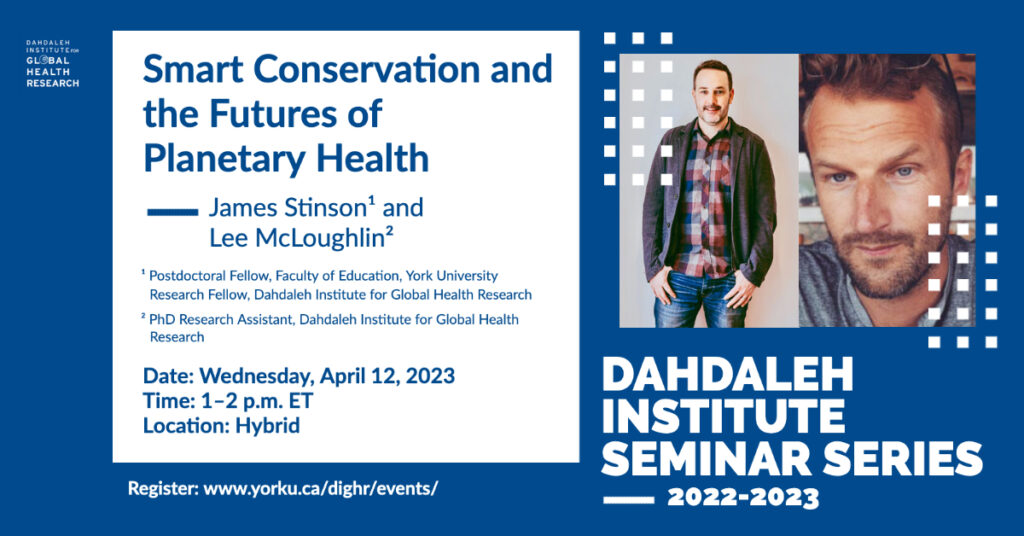Smart Conservation and the Futures of Planetary Health, with James Stinson and Lee McLoughlin
On December 19, 2022, a new global biodiversity framework was adopted at the 15th Conference of the Parties to the Convention on Biological Diversity (CoP 15) in Montreal. Centered around a global agreement to protect 30% of the Earth’s land and sea areas by 2030 (the 30x30 target), the framework has been hailed as a ‘paradigm-changing’ deal that will bend the curve of biodiversity loss and lead to a ‘nature-positive’ society. Others, however, have critiqued the deal as “business as usual” and a doubling down on a flawed approach to conservation that has thus far failed to protect biodiversity, while simultaneously displacing and marginalizing local and Indigenous peoples around the world. Moreover, with 80% of the world's remaining biodiversity, and 40% of remaining forests located on land occupied by Indigenous peoples, achieving the 30x30 target will require a massive expansion of protected areas on Indigenous territories, particularly in the global south.
Drawing on results from the SSHRC-funded project “Smart Conservation and the Production of Nature 3.0 in Belize,” this presentation describes the emergence of a biodiversity-security-technology nexus, and the effects of this nexus on both conservation practitioners and communities bordering parks and protected areas. We argue that efforts to expand conservation areas to meet the new 30x30 target, combined with a shift toward the technological monitoring and policing of protected areas, has the potential to exacerbate conservation-related displacement and violence. In order to promote a more sustainable and just future that fosters planetary health and wellbeing for all life on Earth, we argue for a move away from policing and enforcement-first approaches to conservation, and towards the need to support Indigenous and community-based efforts that care for both people and the planet.

Speaker Profiles
James Stinson is a Postdoctoral Fellow in Planetary Health Education at York University, cross appointed to the Faculty of Education and the Dahdaleh Institute of Global Health Research. He is a cultural, environmental and public anthropologist with a PhD in Anthropology from the University of Toronto. His research explores intersections of Indigenous-led conservation, digital media and technologies, and nature-based recreation in efforts to preserve biodiversity and promote planetary health. He is currently the Principal Investigator of two SSHRC-funded research projects, and Co-Principal Investigator of the York-funded “Partnership for Youth and Planetary Wellbeing.” Building on over a decade of engaged research with Indigenous Maya communities and conservation organizations in Belize, his current research examines how digital surveillance technologies and artificial intelligence – including the Spatial Monitoring and Reporting Tool (SMART) – are impacting environmental governance and shifting relations of power in and around parks and protected areas. A second project engages Indigenous youth in Belize and Canada to understand their experiences of climate change and support their efforts to promote planetary health and well-being. In addition to academic publications in Geoforum, Environment and Planning, and Challenges, he has written for The Conversation, the Canadian Climate Institute, Mountain Life, Wildlife Australia, and facilitated the production of Indigenous films for the United Nation’s Youth Climate Report.
Lee McLoughlin completed his MASc in Australia, he secured a position as a protected areas program director for a local NGO, Ya'axche Conservation Trust, in Belize, Central America. He oversaw the growth of the organization as it took on the co-management of Belize's largest nature reserve and an adjacent agroforestry concession. After 6 years of developing programs, Lee moved to the Wildlife Conservation Society Mesoamerica Program to support the improvement of protected area management capacity across Central America and build public support for the five largest remaining forests in the region. Reflecting on this experience, it led to a growing understanding of the importance of indigenous-led conservation, and in 2021 Lee switched to a PhD in Global Sociocultural Studies where he is applying a political ecology approach to understand and analyse motivations behind the different approaches to protected areas and conservation in Belize. Lee is currently working with Dr. James Stinson at York University as a Research Assistant on the SSHRC-funded project "Smart Conservation and the Production of Nature 3.0 in Belize".
Register below and join us on Wednesday, April 12 at 1 p.m.
RSVP
Registration for this event has closed.
Thank you for your interest in this seminar.
Please find the recap and recording here.

